What is the relation between the refractive indicesμ,μ1 and μ2 if the behaviour of light rays is shown in Figure.
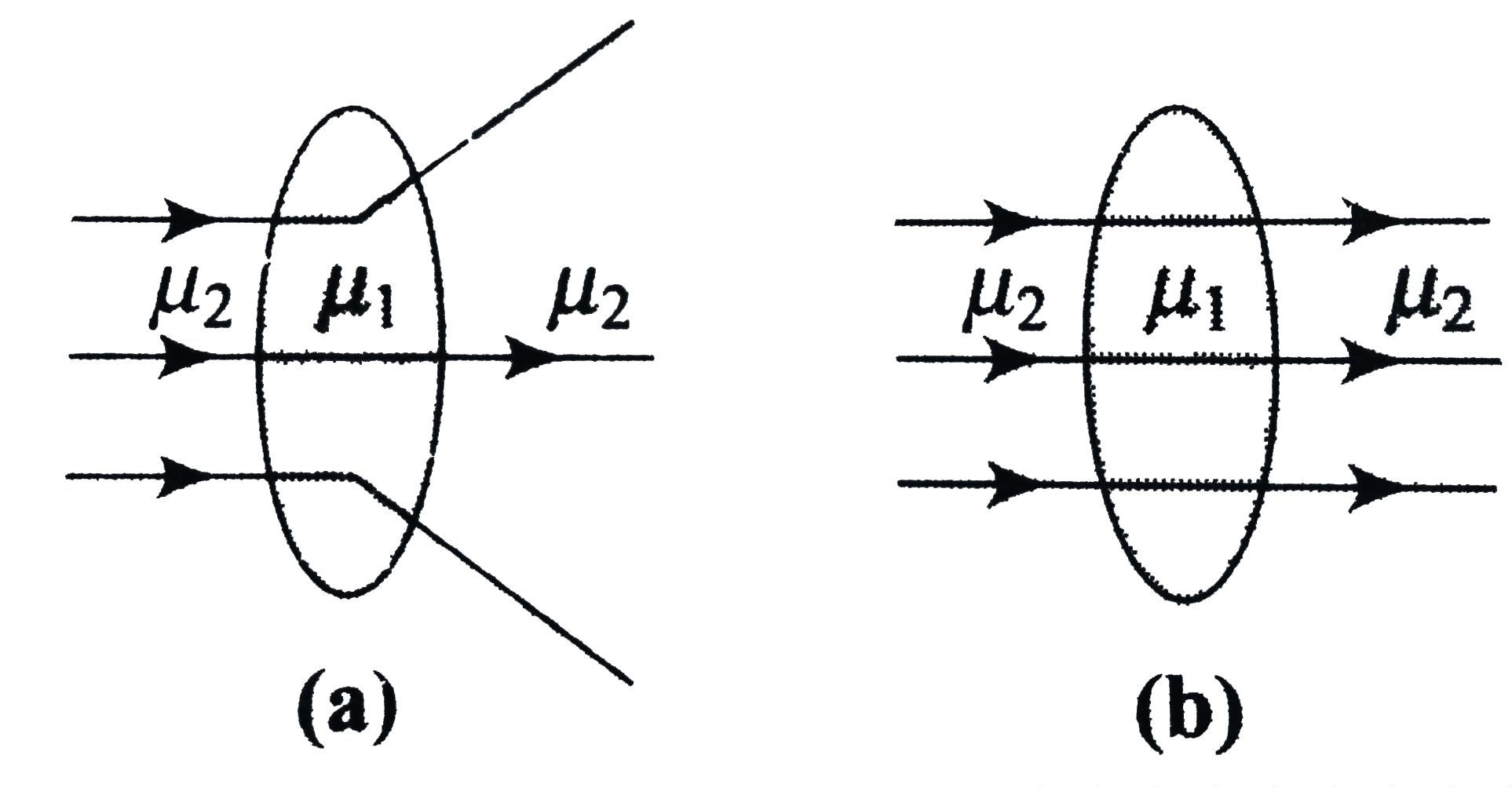
In Fig., the focal length f of the lens is given by
1f=(μμ1−1)(1R1−1R2)
As the rays pass through the lens without any deviation, therefore, f=∞
∴(μμ1−1)1R1−1R2=1∞=0
For a double convex lens, (1R1−1R2)is+
∴μμ1=1=0orμμ1=1orμ=μ1
In Fig.(b),
1f=(μμ2−1)(1R1−1R2)
As the lens behave as a diverging lens , therefore f is negative
As the factor (1R1−1R2) is positive,
∴(μμ1−1) is negative
i.e., (μμ2−1)<0orμμ2<1orμ<μ2
Topper's Solved these Questions
- OPTICSBOOK - PRADEEPCHAPTER - OPTICSEXERCISE - Very short answer question
5 Videos
- OPTICSBOOK - PRADEEPCHAPTER - OPTICSEXERCISE - very short answer questions
1 Videos
- MAGNETIC EFFECT OF CURRENT AND MAGNETISMBOOK - PRADEEPCHAPTER - MAGNETIC EFFECT OF CURRENT AND MAGNETISMEXERCISE - Competition Focus (Multiple Choice Questions)
2 Videos
Similar Questions
A monochromatic light is incident on the plane interface AB between two media of refractive indices μ1 and (μ2>μ1) at an angle of incidence θ as shown in Fig.
The angle θ is infinitesimally greater than the critical angle for the two media so that total internal reflection takes place. Now, if a transparent slab DEFG of uniform thickness and of refractive index μ3 is introduced on the interface (as shown in the figure), show that for any value of μ3 all light will ultimately be reflected back into medium II.
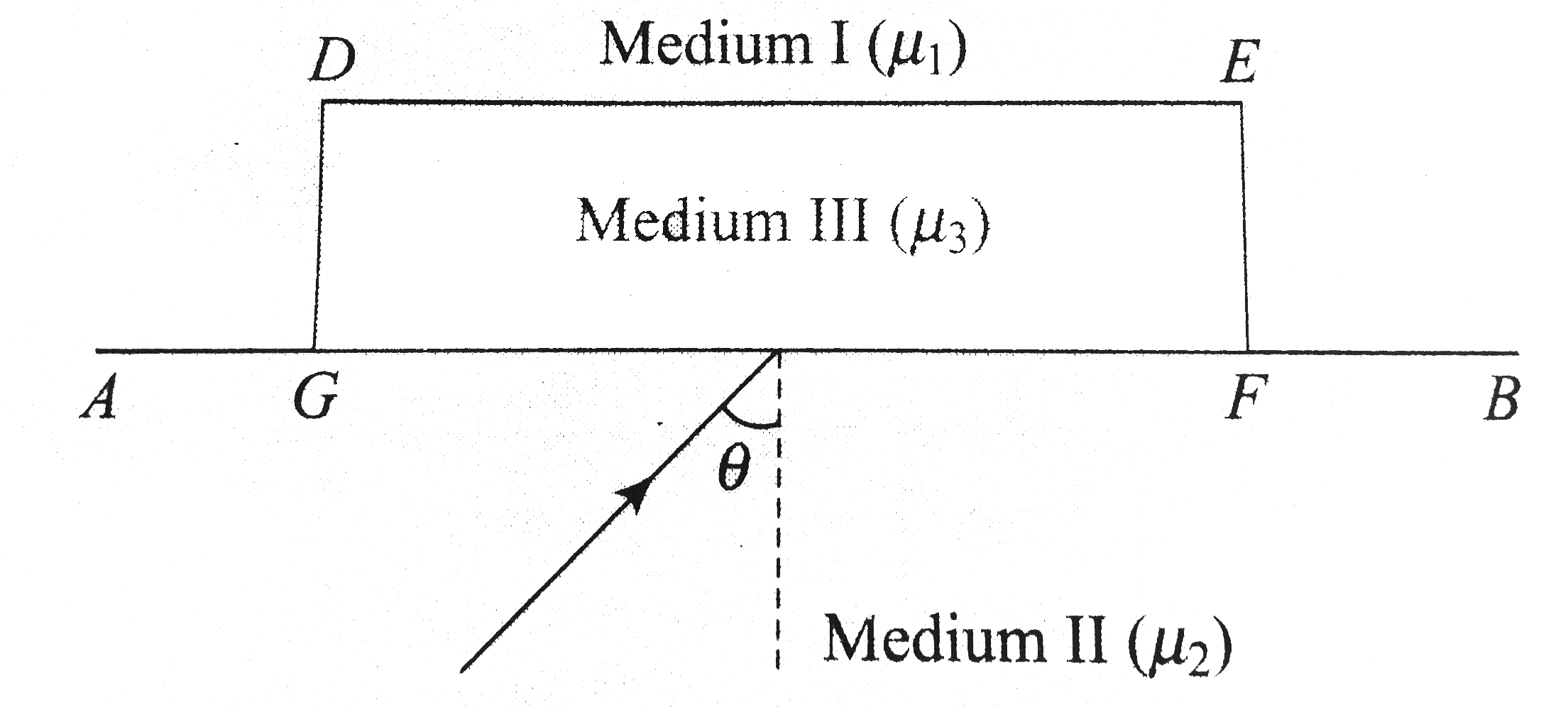
View SolutionA, B , C and D are four transparent sheets of equal thickness and made of material of refractive indices μA,μB,μC,andμD. If a light ray propagates through them as shown in the figure, compare their refractive indices and also find if any of them have the same refractive index.
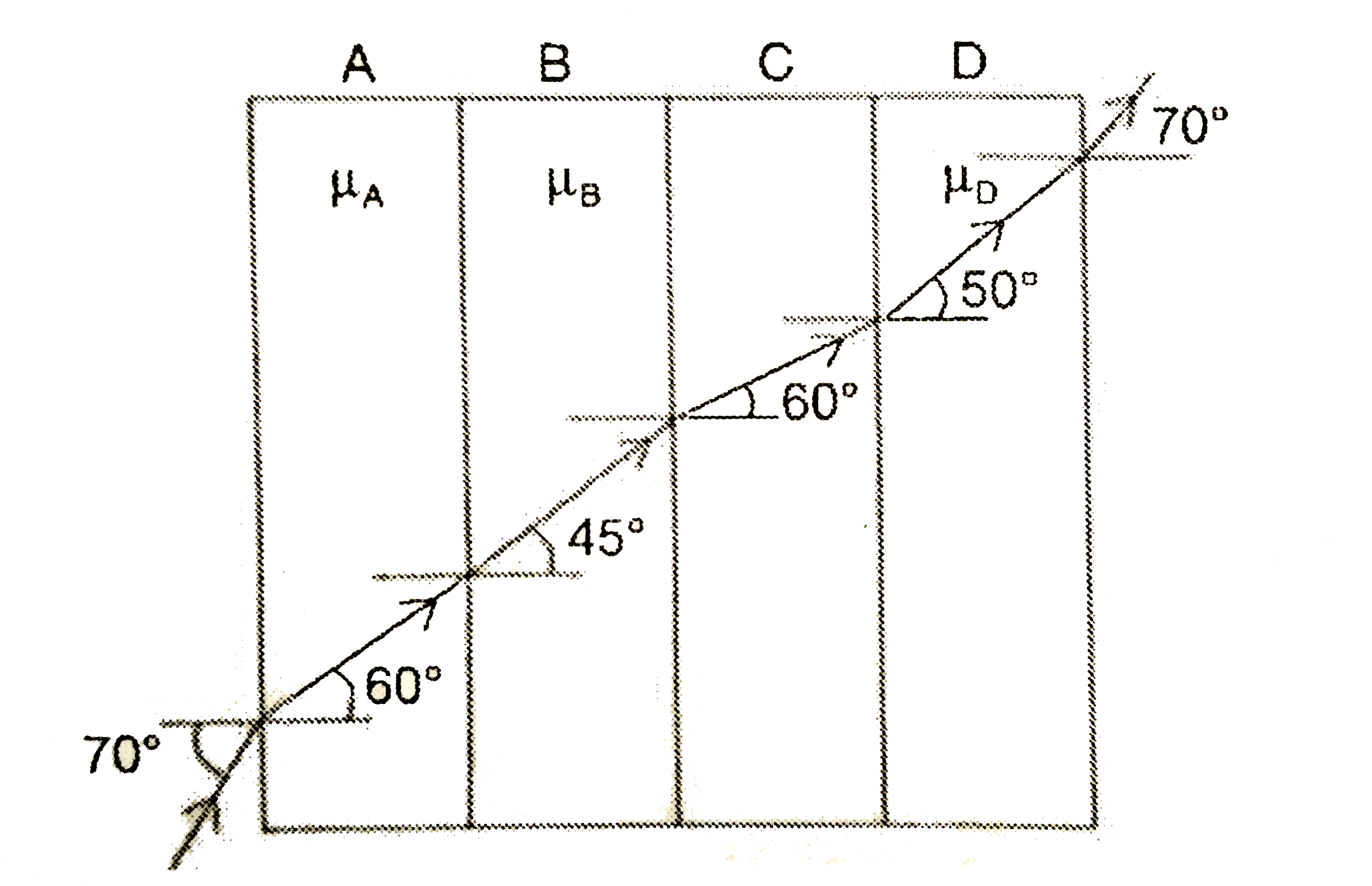
View Solution
Knowledge Check
The relation between refractive indices u,μ1,μ2. if the behaviour of light ray is as shown in figure
 Aμ>μ1>μ2Bμ<μ2<μ1Cμ<μ2,μ=μ1Dμ2<μ1,μ=μ2
Aμ>μ1>μ2Bμ<μ2<μ1Cμ<μ2,μ=μ1Dμ2<μ1,μ=μ2A ray of light passes through four transpar ent media with refractive indicesμ1,μ2,μ3 and μ4 as shown in figure. The surfaces of all media are parallel. If the emergent ray is parallel to the incident ray, we must hav
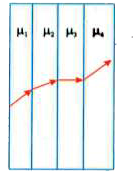 Aμ1=μ2Bμ2=μ3Cμ3=μ4Dμ4=μ1
Aμ1=μ2Bμ2=μ3Cμ3=μ4Dμ4=μ1A rectangular block is composed of three different glass prisms (with refractive indices μ1,μ2 and μ3) as shown in the figure below. A ray of light incident normal to the left face emerges normal to the right face. Then the refractive indices are related by
 Aμ21+μ22=2μ23Bμ21+μ22=μ23Cμ21+μ23=2μ22Dμ22+μ23=2μ21
Aμ21+μ22=2μ23Bμ21+μ22=μ23Cμ21+μ23=2μ22Dμ22+μ23=2μ21
A ray of light passes through a plane boundary separating two media whose refractive indics are μ1=3/2 and μ2=4/3. (i) If the ray travels from medium 1 to medium 2 at an angle of incidence of 30∘, what is the angle of refraction ? (ii) If the ray travels form medium 2 to medium 1 at the same angle of incidence, what is the angle of refraction ?
View SolutionR is the radius of curvature for both the surfaces of lens shown in figure. Refractive index μ1,μ2andμ3 are indicated in the figure. Light rays are incident from the side of refractive index μ1 as shown. If f is focal length of lens then find f/R for μ1=1,μ2=1.5,μ3=2.
|0123456789|
View SolutionA ray of light passes through four transparent media with refractive indices μ1,μ2,μ3,andμ4 as shown in figure. The surfaces of all media are paralle. If the emerent ray CD is parallel to the incident ray AB, we must have
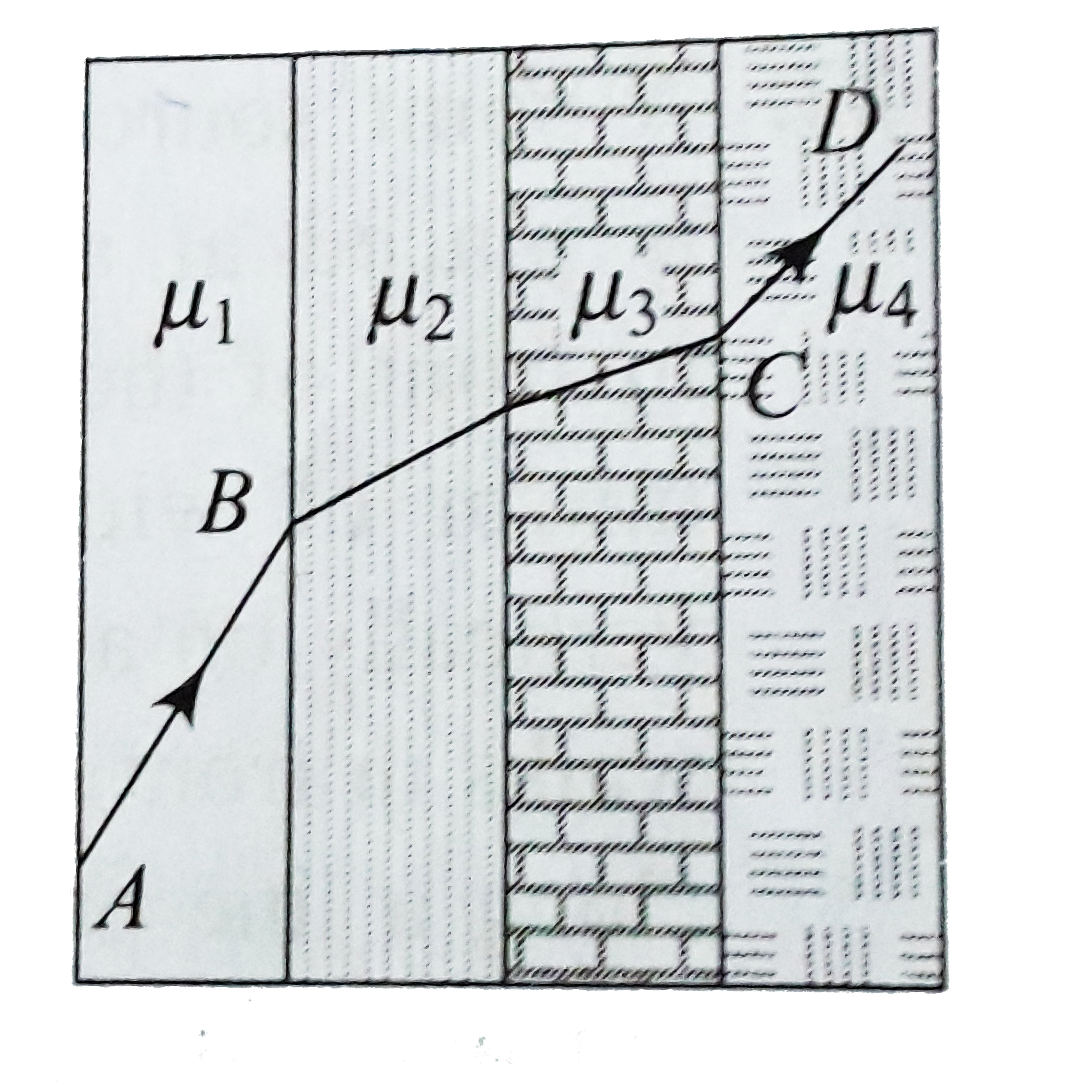
View SolutionA ray of light passes through four transparent media with refractive indicesμ1,μ2,μ3 and μ4 as shown in the figure. The surfaces of all media are parallel. If the emergent ray CD is parallel to the incident ray AB, we must have
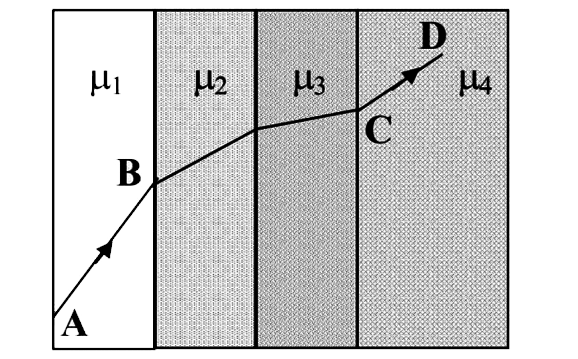
View SolutionA curved surface of radius R separates two medium of refractive indices μ1andμ2 as shown in figures A and B .
_E01_077_Q01.png)
Choose the correct statement(s) related to the real image formed by the object O placed at a distance x, as shown in figure A.
View Solution
